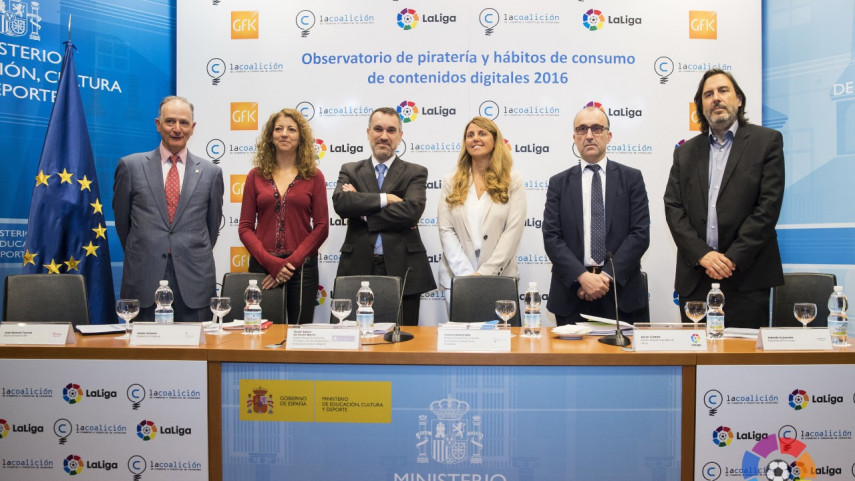Nota de Prensa
TUE 25.04.2017
Despite digital piracy within Spain having witnessed a slight decrease in absolute terms, the percentage of Spanish residents accessing pirated content has remained stable and indeed has increased in some sectors, such as the music and book industries.
In 2016 there were 4.128 billion cases of individuals accessing content illegally, which represented a 4.2% decrease on the figure from 2015, with a market value of €23.294bn (-3.2%). However, the loss of profits within the cultural and content industries rose to €1.783bn.
These are some of the main findings from the 2016 Observatory on Piracy and Digital Content Consumption Habits, conducted by the independent consultancy firm GfK, which was today presented by LaLiga and the Coalition of Content Creators and Industries. “The current situation proves that the legislative measures are having a positive impact, although the results continue to fall short. We require great resources to be put in place and for the procedures to be sped up. We've witnessed a reduction in piracy levels for the first time in 10 years and we have a fantastic opportunity to put things right in terms of the massive damage that piracy inflicts on content creators and throughout the industries, but also on employment, the Spanish public coffers and the competitiveness of Spain in the international market. We want to start by catching up countries like Italy and Portugal, whilst closing in as much as possible on the United Kingdom, France and Germany," highlighted the director of the Coalition, Carlota Navarrete.
For his part, Javier Gomez, LaLiga's corporate managing director, declared, "We at LaLiga are pleased with the results collected by the piracy report, but there's still a lot of work to be done. We've seen how supporters are beginning to develop an awareness that piracy is detrimental to their clubs and other parties. In the football industry, online piracy levels dropped from 21% to 18% between 2015 and 2016 in terms of the number of users, but we've identified that there are other tools that these individuals are starting to use to gain illegal access to football broadcasts."

ILLEGAL ACCESS TO CONTENT AND RELATED ATTITUDES
A significant proportion of the respondents admitted to illegally accessing products, with the exact percentages varying as follows according to the type of content in question: music (26%), films (32%), video games (12%), books (22%), TV shows (27%) and football matches (10%).
"Original content is too expensive" was among the most common justifications for illegal access to content, being cited by 47% of the individuals in question. The "speed and ease of access" (42%) and "I already pay for my Internet connection" (47%) were similarly popular responses, followed by "I don't want to pay for content that I might end up not liking" (37%), "I'm not harming anyone" (24%) and "There are no legal consequences for pirating, it's no big deal" (also 24%).
ACCESS CHANNELS AND SOURCES OF REVENUE
Search engines remain the predominant means through which users access illegal content (78%), with Google specifically being used by nine out of every 10 people who access pirated content. Over 67% of websites offering access to illegal content make their money from advertising.
However, these sites have a variety of other revenue streams. Notably, more than a third of the relevant respondents (33.8%) had to register as users and submit personal data to access content.
It is also noteworthy that over a third (37.6%) of advertising on pirate sites comes from mainstream consumer brands from the likes of the food, fashion, insurance and telecom sectors. This reinforces the fact that there is an urgent need for greater collaboration between the content industries and advertisers to improve the online advertising ecosystem.
IMPACT ON EMPLOYMENT AND STATE REVENUES
The figures concerning the impact of piracy on employment make for even more disturbing reading for content creators and the content industries. The sector currently employs 65,926 people, but a piracy-free scenario would enable the creation of 21,697 new direct jobs, a 33% increase, and around 110,000 further indirect jobs.
Piracy cost the Spanish public coffers in the region of €361 million in VAT last year, as well as €166m in social security contributions and €49m in personal income tax (IRPF). In other words, state revenues in 2016 could have been a total of €576m higher had it not been for illegal access to content – the cumulative losses on this front since 2012 now stand at €2.772 billion.
EFFECTIVENESS OF ANTI-PIRACY MEASURES
Respondents rate blocking access to websites offering the offending content (68%) and punishing Internet providers (61%) as the two most effective measures to combat piracy. Fining users themselves (53%) and running social awareness campaigns (52%) were the next most popular picks.
© LALIGA - 2017


